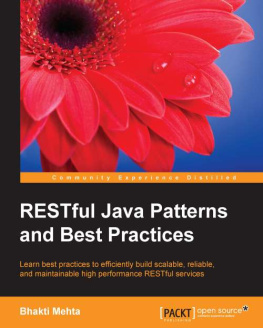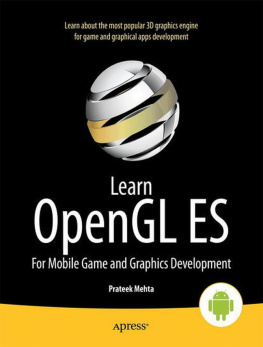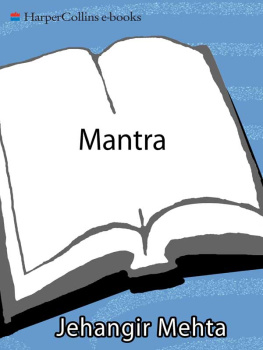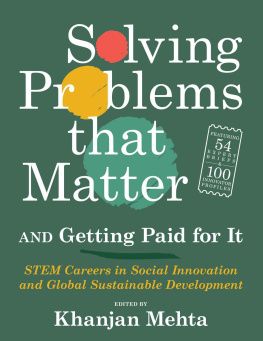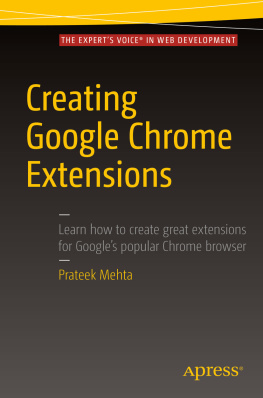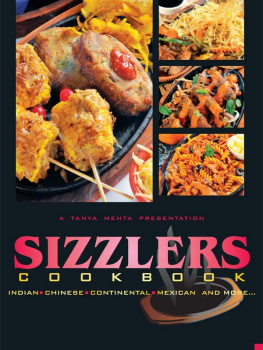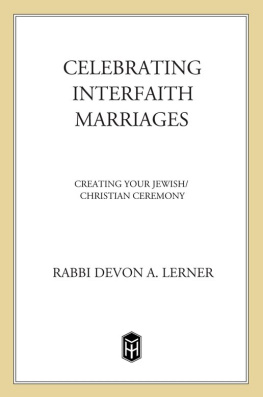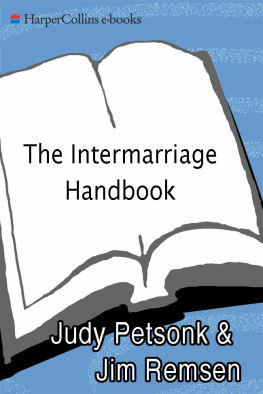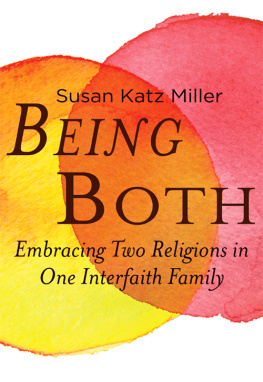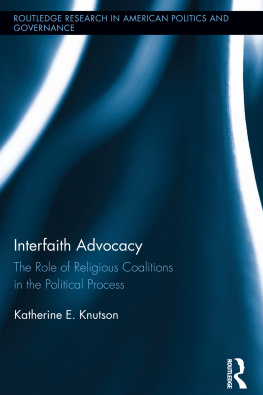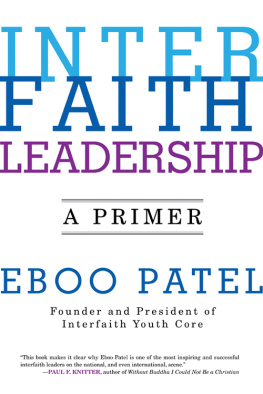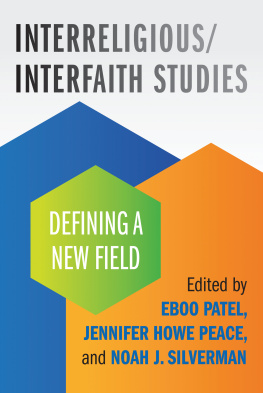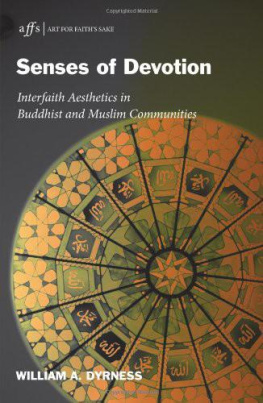Contents
Guide
Pagebreaks of the print version
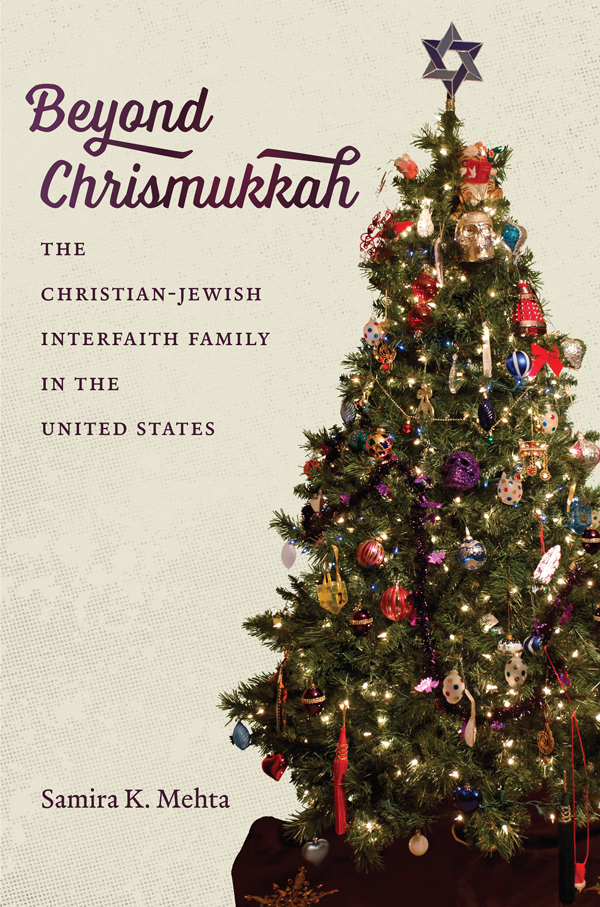
Beyond Chrismukkah
SAMIRA K. MEHTA
Beyond Chrismukkah
The Christian-Jewish Interfaith Family in the United States
The University of North Carolina Press Chapel Hill
2018 The University of North Carolina Press
All rights reserved
Set in Arno Pro by Westchester Publishing Services
Manufactured in the United States of America
The University of North Carolina Press has been a member of the Green Press Initiative since 2003.
Library of Congress Cataloging-in-Publication Data
Names: Mehta, Samira K., author.
Title: Beyond Chrismukkah : the Christian-Jewish interfaith family in the United States / Samira K. Mehta.
Description: Chapel Hill : University of North Carolina Press, [2018] | Includes bibliographical references and index.
Identifiers: LCCN 2017020958 | ISBN 9781469636351 (cloth : alk. paper) | ISBN 9781469636368 (pbk : alk. paper) | ISBN 9781469636375 (ebook)
Subjects: LCSH : Interfaith marriageUnited States. | Children of interfaith marriageUnited States. | Interfaith familiesUnited States. | JewsUnited StatesIdentity.
Classification: LCC HQ 1031 . M 445 2018 | DDC 306.84/30973dc23
LC record available at https://lccn.loc.gov/2017020958
Cover illustration: Multi-Ethnic Holiday Foliage 2016 Michael Gale. Used with permission.
Chapter 5 was previously published in a different form as Chrismukkah: Millennial Multiculturalism, Religion and American Culture: A Journal of Interpretation 25:1 (Winter 2015): 82109. Used here with permission.
Contents
Figures
Acknowledgments
I have always been a communal learner, and so more people than I can possibly thank have helped develop this project. I alone am responsible for the shortcomings in Beyond Chrismukkah , but its contributions to our field and to the study of interfaith family life in the United States were created in collaboration with the colleagues, friends, and informants who have given of their time and expertise throughout my writing and research. Most importantly, I must offer my most profound thanks to the people who opened their lives to me. Most of them remain unnamed in this monograph, but I am beyond grateful for their trust.
Gary Laderman has believed in me and my work since the beginning, even at the moments when I did not believe in myself. I am grateful for his mentorship, his generosity, the pride that he shows in me, and his incisive and constructive criticism. Elizabeth Bounds and Eric Goldstein have always been available for critical feedback and wise counsel. Don Seeman answered phone calls from the field to brainstorm and troubleshoot ethnographic encounters. Tisa Wenger has read more than one complete draft of this project, and her feedback has sharpened both my thinking and my language. Dianne Stewart, Judith Weisenfeld, Rebecca Davis, and Laura Levitt have been unstinting with their friendship and their mentorship. Wallace Best was my advisor early on, and he has never truly given up the role. Julie Byrne, Amy DeRogotis, Sylvester Johnson, Pamela Klassen, and Kathryn Lofton have been very generous with their support. I am the scholar that I am because of the teaching, mentorship, and scholarship of Bob Orsi, David Hall, Ann Braude, Mark Wallace, Ellen Ross, and Yvonne Chireau.
I have received feedback on drafts and chapters of this project at seminars and workshops of the Sloan Foundations Center for Myth and Ritual in American Life (MARIAL), the Tam Center for Jewish Studies, and the program in Religious Practices and Practical Theology, all at Emory University. I thank Courtney Bender and the Religion in America Seminar at Columbia University for the opportunity to present an early draft of chapter 4. An earlier version of chapter 5 appeared in the Winter 2015 issue of the journal Religion and American Culture . I thank Phil Goff, the editorial board, and the anonymous reviewers for their contributions to that chapter. The Religion, Food, and Eating Seminar of the American Academy of Religion; the Unitarian Universalist Scholars and Friends; and the Donner Institutes Symposium on Religion and Food have all offered important space for honing ideas. I have received valuable feedback on my work at many conferences including the American Academy of Religion, the Association for Jewish Studies, and the Scholars Conference of the American Jewish Historical Society.
My work would not be possible without archives and the people who maintain them. I am grateful to the staffs of the American Jewish Archives, the University of Notre Dame, the Catholic University of America archives and the Stuart A. Rose Manuscript, Archive, and Rare Books Library at Emory University. I firmly believe that behind every scholar stands an army of reference librarians. In particular, I would like to thank Erica Bruchko, of the Robert W. Woodruff Library at Emory University; and Gloria Korsman and Renata Kalnins, both of the Andover Theological Library at Harvard Divinity School.
At the University of North Carolina Press, Elaine Maisner not only saw the potential in my work, but also has been a patient editor who has guided me to more careful and accurate uses of language and, therefore, more precise thought. Becki Reibman has answered my endless questions about process. Thank you also to Stephen Barichko, Dino Battista, and their respective teams.
I benefited from the financial generosity of a number of organizations. Emory University funded large portions of this work and attendance at conferences to share it. The Tam Institute for Jewish Studies at Emory University and the Bernard Radar Marcus Center of the American Jewish Archives provided me with funding for summer research. The University Seminars of Columbia University provided subvention funds to create an index. The Northeastern Consortium for Faculty Diversity gave me the opportunity to spend a year at Allegheny College, developing as a teacher and a scholar. The MARIAL Center granted both a year of funding and a generous research budget, and I completed the book while on fellowship at the Library of Congresss John W. Kluge Center.
Throughout the process, many colleagues and friends have been supportive and challenging interlocutors. Feminist conventional wisdom says that one should never be the only woman in a writing group. That advice might apply generally, but not when one has the luck to write with David King, Brian Campbell, and Lerone Martin. They, and Ben Brazil, have critiqued many drafts. Over the years many colleagues have read drafts, offered feedback, and let me know when interfaith families appeared in popular culture or in the news. My deepest appreciation to Brandon Bayne, Joanna Brooks, Letitia Campbell, Jenny Caplan, Jodi Eichler-Levine, Thomas Fabisak, Gillian Frank, Shreena Gandhi, Rachel Gross, Ryan Harper, Rachel Kranson, Adrienne Krone, Jenny Wiley Legath, Rachel Lindsay, Emily Mace, Mandy McMichael, Sara Moslener, Donna Mote, Nora Rubel, John Senior, Emily Sigalow, Josef Sorett, Angela Tarango, Jennifer Thompson, Heather White, and Ben Zeller. Amy Caldwell often shared insights about the publishing process and I have appreciated them.
I have had a number of institutional homes. Thank you to the communities of Emory University, Allegheny College, the Museum of Jewish Heritage, and the John W. Kluge Center of the Library of Congress. In particular, thank you to my current institutional home, Albright College. Victor Forte, Jennifer Koosed, Mary McGee, and Robert Seesengood are unparalleled departmental colleagues. Trudy Prutzman has lightened many a load. I have been similarly lucky in my writing support group: Bridget Hearon, Heidi Mau, Shreeyash Palshikar, and Carrie Skulley. Thank you also to the Bridge Club for making me welcome.


